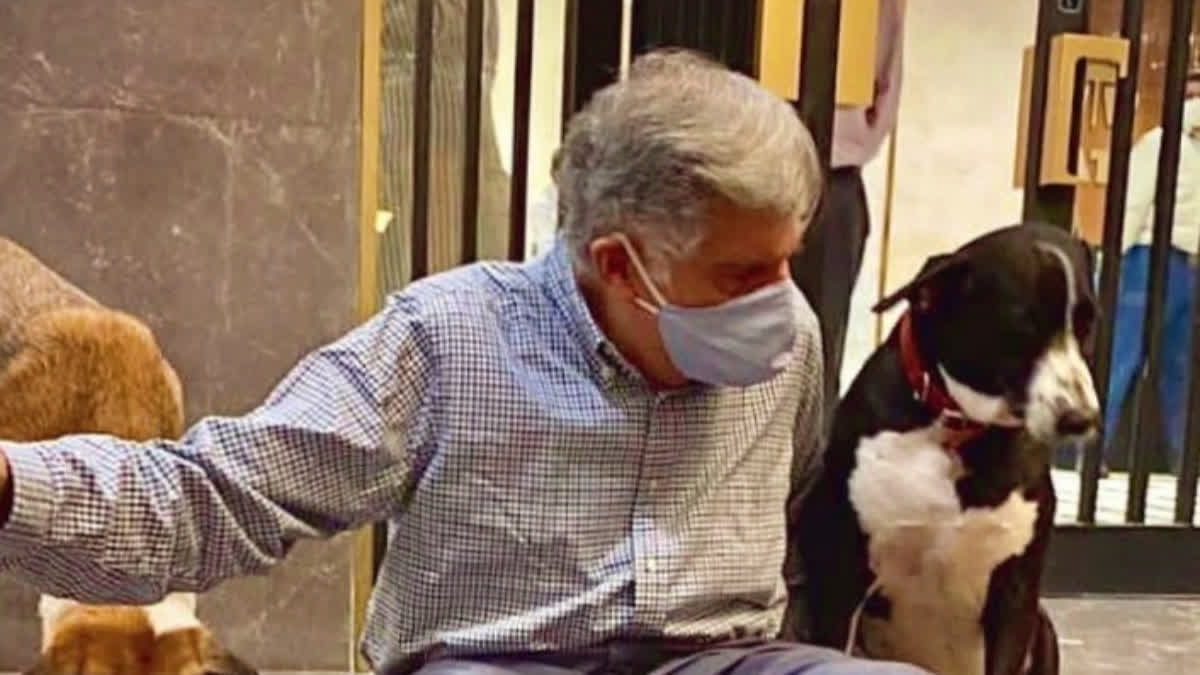In the same will that addressed his estimated ₹10,000 crore estate and made allowances for family members and close staff, business titan Ratan Tata saw to it that his beloved pet, Tito, would be cared for in perpetuity. Tata’s will made provision for “unlimited care” for Tito. This gesture is emblematic of his almost familial bond with dogs.
Another lesser-known incident from nearly two decades ago displays the great love this great personality had for dogs.
United Services Club aka U.S. Club in Mumbai is where high-ranking officers, businessmen, and their families gather. For Tata, the U.S. Club was a place where he would bring his furry friends along, letting them romp and play. They had grown up under the care of Tata and a handful of other members who treated them with affection. The dogs had been fed, cared for, and tended to with the quiet commitment that defined Tata’s values.
U.S. Club in Mumbai is frequented by high profile businessmen, officers and dignitaries (ETV Bharat) However, all sanctuaries, it seems, are prone to occasional disruptions, and it came in the form of a new rule. In late 2005, a change in Club administration introduced an unfamiliar face — an Army Colonel who was the Club Secretary at the time. The Colonel had conveyed orders from higher-ups that the Club's dogs, those “poor, innocent dogs” who “had no other home to go to,” as Tata wrote in his letter, would no longer be welcome. They weren’t to be fed or taken care of within Club premises anymore.
New Rules For Furry Creatures
In October of 2006, Ratan Tata penned a letter that would echo far beyond the polished walls of the U.S. Club in Mumbai. Tata, then the chairman of Tata Sons, wrote with measured disappointment and restrained frustration in a tone that may surprise many who assume that powerful men are only moved by powerful interests. This was a man moved not by profit, politics, or power but by the quiet companionship of animals, specifically the indie dogs that he and a few others had lovingly tended to at the U.S. Club.
Now, one might think that a man of Ratan Tata’s stature could simply shrug off this inconvenience. After all, he was a member for life. But Tata’s response was anything but entitled. He tried diplomacy. He reached out to those he assumed could mediate — a Major General among them. His appeals, however, met a brick wall of institutional stubbornness, or, as he described, “acrimony and arrogance.”
What followed was a spectacle as strange as it was disheartening. As Tata's letter recounts, his own driver, who had regularly brought food for the dogs from Tata’s house, faced physical threats of arrest. “Things got very nasty,” Tata noted, a gentleman’s phrasing for what must have been a thoroughly unkind affair.
The Letter He Wrote
In the letter he eventually wrote to an Army Commander who was appointed the new Club Secretary, Tata’s words are laced with hurt. He writes not as a business tycoon but as a man disappointed by the needless suffering inflicted on innocent beings. “As far as I could tell, the plan was to eventually eliminate them in one form or other,” he writes. It’s a line that stands starkly in the letter.
Ratan Tata chose to walk away. His letter conveys his disillusionment with an institution he had once cherished, a place he could no longer feel connected to because of the callousness shown toward the dogs he loved. “I must confess that the appeal of the Club diminished significantly,” he wrote, a polite yet decisive farewell to an institution that had fallen short of his own unwritten code of kindness. He could no longer bear to be part of a community that disregarded the simple joy he found in his daily visits with his dogs.
Ratan Tata's Quiet Withdrawal
In a choice that speaks volumes, he stopped going to the U.S. Club. He didn’t storm out or make a scene. He simply, with characteristic dignity, withdrew. Here was a man who could move industries, who could orchestrate billion-dollar deals, yet his final stance at the U.S. Club was not about his influence or prestige. It was about standing up in his own way for the voiceless creatures who had been cast aside.
In reading Tata’s letter, we glimpse a man whose legacy is shaped not only by his business acumen but by his sense of duty to others, including animals who had no one else to look after them. “I feel deeply hurt—not for myself, but for the manner in which these poor innocent animals were being treated,” he confessed.
For those who revere him, this story is not just about his love for dogs but about a worldview where power doesn’t overshadow compassion. It’s about the kind of leader who cared for his staff, his family, and even his pets, ensuring that they would all be taken care of long after he was gone.
